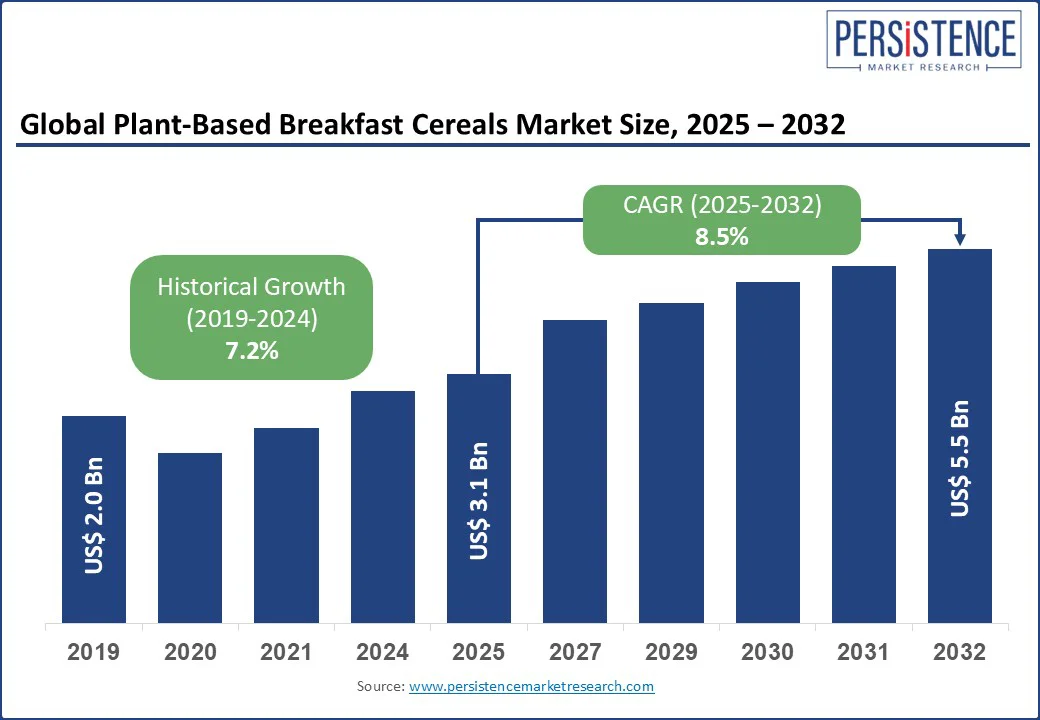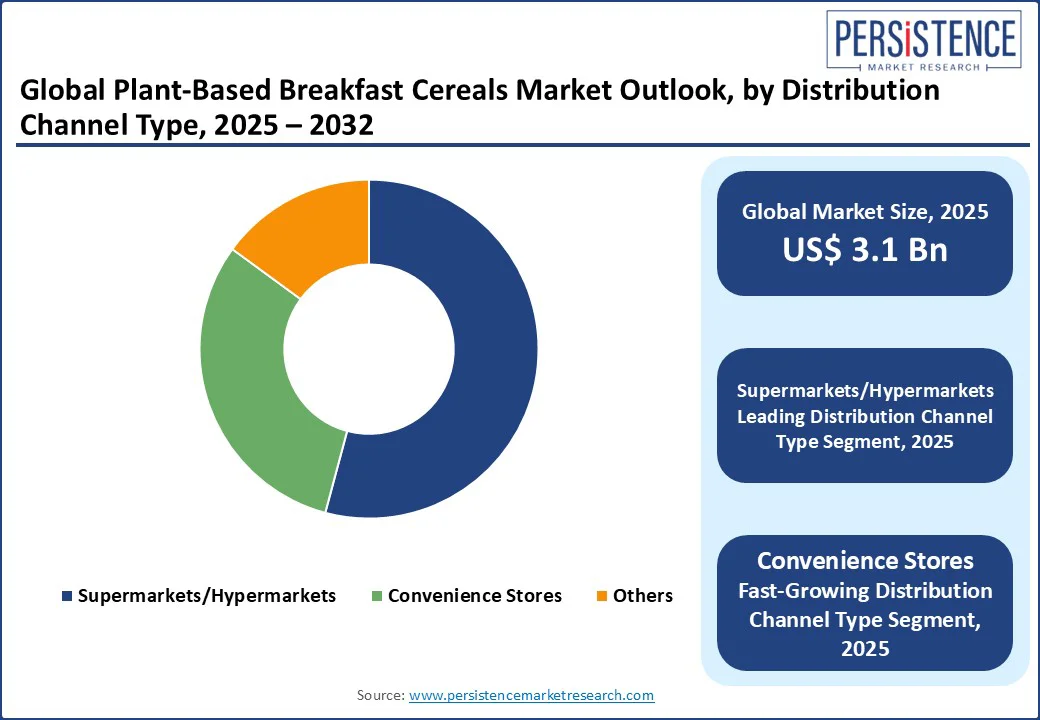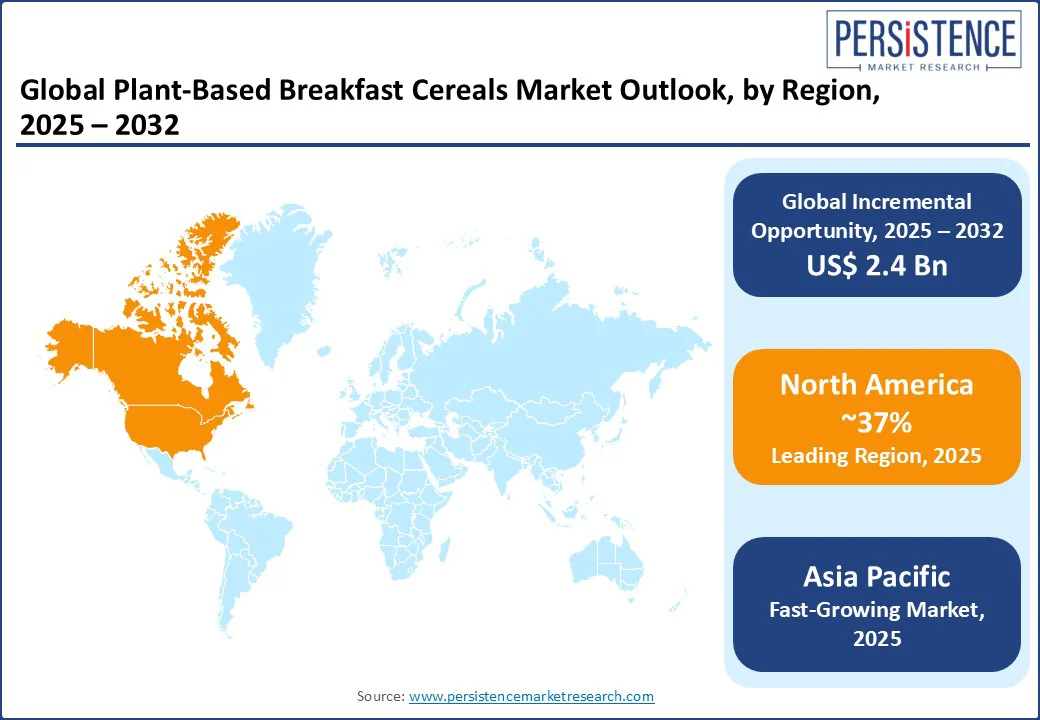ID: PMRREP32819| 177 Pages | 18 Aug 2025 | Format: PDF, Excel, PPT* | Food and Beverages

The global Plant-Based Breakfast Cereals Market size is likely to value at US$ 3.1 Bn in 2025 and is expected to reach US$ 5.5 Bn by 2032, registering a CAGR of 8.5% during the forecast period.
The Plant-Based Breakfast Cereals industry has experienced steady growth, driven by the increasing prevalence of health-conscious lifestyles, advancements in food processing technology, and the rising demand for vegan and sustainable food options.

Key Industry Highlights:
|
Global Market Attribute |
Key Insights |
|
Plant-Based Breakfast Cereals Market Size (2025E) |
US$ 3.1 Bn |
|
Market Value Forecast (2032F) |
US$ 5.5 Bn |
|
Projected Growth (CAGR 2025 to 2032) |
8.5% |
|
Historical Market Growth (CAGR 2019 to 2024) |
7.2% |
The global surge in health-conscious consumers and the adoption of plant-based diets are key drivers of the plant-based breakfast cereals market. According to the World Animal Foundation, there are more than 13.4 Million Vegans in the US, & The Vegan Share of the US population in Selected Countries in 2024 is 4%. The rising incidence of these conditions, particularly in urban populations, drives demand for nutrient-rich, plant-based breakfast options. In the U.S., a significant number of consumers have shifted to plant-based diets in recent years, necessitating innovative cereals made from grains such as oats and rice.
Technological advancements in food formulation and fortification are propelling market growth. Modern products, such as Kellogg’s plant-based granola clusters, offer enhanced nutritional profiles with added protein and fiber, improving consumer satisfaction. Recent studies have shown that fortified plant-based cereals can help reduce dietary deficiencies compared to traditional options. The integration of natural flavors and sustainable sourcing further supports adoption in health-focused segments.
Government health initiatives and increased funding for sustainable food infrastructure also drive market expansion. In India, national nutrition schemes such as POSHAN Abhiyaan have expanded access to plant-based foods, increasing demand for affordable cereals. In North America, policies promoting vegan alternatives for public health incentivize retailers to invest in diverse product lines, with a notable rise in plant-based product shelf space reported in recent years.
High costs of plant-based breakfast cereals continue to hinder widespread adoption, particularly in emerging markets. These products, often made with premium ingredients such as organic oats and fortified nutrients, command high prices. Beyond the initial purchase cost, ongoing expenses for sourcing sustainable raw materials, such as non-GMO grains, and certification requirements add to the total cost.
For consumers in resource-limited regions, such as parts of Latin America and rural India, these financial burdens are difficult to justify, even with growing demand for healthy breakfast options. Premium plant-based cereals are often priced significantly higher than conventional options, limiting accessibility.
The need for stable supply chains to source plant-based ingredients also restricts market growth. Volatile commodity prices for grains such as corn and wheat require specialized logistics, and industry reports highlight shortages of organic suppliers in Asia Pacific regions. This supply gap, combined with high transportation costs, further limits the adoption of innovative products in developing regions, where logistics expenses can substantially increase retail prices.
The development of functional and protein-enriched plant-based cereals presents significant growth opportunities, particularly in fitness-oriented markets, on-the-go snacking, and dietary-specific segments. These enhanced products address the limitations of traditional cereals, making them ideal for busy lifestyles, travel, and health management scenarios.
For instance, Nature's Path’s Eco Pac granola, a sustainable and nutrient-packed option, exemplifies this shift toward functionality and eco-friendliness. As consumer preferences increasingly prioritize personalized health foods, demand for functional solutions continues to rise, especially in regions with dietary restrictions.
The rise of sustainable and clean-label trends, such as gluten-free and organic variants, offers another growth avenue. These products require advanced formulations with precise nutrient balancing. Clinical research has shown that functional plant-based cereals using oats can improve digestion compared to traditional methods, driving demand for innovative offerings.
The growing adoption of e-commerce platforms for direct-to-consumer sales and subscription models also enhances market potential. Companies such as Bob’s Red Mill are integrating digital tools into their distribution, allowing for personalized recommendations and minimizing retail challenges. The expansion of online sales of plant-based cereals is supporting market growth by improving accessibility and consumer engagement.
The global plant-based breakfast cereals market is segmented into Ready-To-Cook Cereals and Ready-To-Eat Cereals. Ready-to-Eat Cereals dominate, holding approximately 73.50% of the Plant-Based Breakfast Cereals market share in 2025, due to their critical role in providing convenient, nutrient-dense options for busy mornings. Advanced ready-to-eat products, such as General Mills’ plant-based Cheerios, are widely used for their ease and health benefits.
Ready-To-Cook Cereals are the fastest-growing segment, driven by increasing demand for customizable, warm breakfasts. Innovations in quick-cook oats and rice blends, such as PepsiCo’s Quaker options, enhance nutritional value and appeal, boosting adoption in health-conscious households.
The Plant-Based Breakfast Cereals market is divided into Wheat, Corn, Oats, Rice, and More. Oats lead with a 28.5% share in 2025, driven by their high global popularity, with millions of consumers opting for oat-based products annually for their fiber and protein content.
Rice-based cereals are the fastest-growing segment, fueled by rising demand for gluten-free and Asian-inspired variants. The increasing success rate of rice-fortified products drives demand for specialized ingredients in diverse markets.
The global Plant-Based Breakfast Cereals market is segmented into Supermarkets/Hypermarkets, Convenience Stores, and Others. Supermarkets/Hypermarkets dominate with a 54.35% share in 2025, driven by their high product volumes and wide accessibility. Large retailers, particularly in North America and Europe, rely on extensive shelving for diverse plant-based options.
Convenience Stores are the fastest-growing segment, fueled by the increasing establishment of quick-purchase outlets for on-the-go snacks. These stores, equipped with grab-and-go technologies, cater to the growing demand for portable and healthy breakfasts, boosting product adoption.

In North America, the U.S. dominates the global plant-based breakfast cereals market, expected to account for 37.0% market share in 2025, driven by high health awareness and advanced retail infrastructure. Demand for oat-based and fortified cereals is gaining momentum, fueled by the growing adoption of vegan and gluten-free diets. Leading brands such as Kellogg Co. and General Mills Inc. are introducing innovative product lines tailored to the needs of health-conscious consumers.
Preferences are increasingly shifting toward sustainable, protein-enriched plant-based systems, with companies such as Post Holdings, Inc. leveraging natural fortification to boost nutritional value. Health remains a key purchase driver, supported by stringent FDA regulations that promote the use of clean-label, transparent ingredients. Additionally, favorable government policies for plant-based foods are encouraging retailers to diversify offerings and expand shelf space. The resulting increase in product variety, combined with the emphasis on nutrition, sustainability, and regulatory compliance, is shaping a dynamic and competitive market landscape.
Europe’s plant-based breakfast cereals market is spearheaded by Germany, the U.K., and France, benefiting from robust regulatory frameworks and strong consumer interest in sustainable, health-focused foods. Germany holds the dominant share, with sales boosted by leading brands such as Nestlé S.A. and Nature's Path Foods, which are capitalizing on the demand for high-quality oat and wheat-based cereals. The EU’s Food Information Regulation supports both innovation and compliance, fostering the development of advanced formulations with transparent labeling.
In the U.K., growth is fueled by the rising popularity of organic variants, with products such as Calbee’s granola appealing to consumers seeking nutrition alongside eco-conscious packaging. France is seeing a surge in demand for rice-based cereal options, with companies such as B&G Foods, Inc. offering tailored solutions to meet local tastes. Across the region, policies promoting sustainable sourcing are further strengthening market prospects, ensuring long-term expansion and competitive product diversification.
Asia Pacific is the fastest-growing region, with a projected CAGR of 6.45% during the forecast period, led by China, India, and Japan. In India, increasing cases of lifestyle-related diseases and government initiatives such as POSHAN Abhiyaan are boosting demand for affordable oat-based cereal systems. Companies such as Marico Limited play a key role by offering cost-effective, nutrient-rich solutions that appeal to a broad consumer base.
China’s market expansion is driven by extensive retail network growth and a rising middle-class population seeking fortified, health-oriented breakfast options. Global players such as PepsiCo are leading innovation in the fortified cereals space, tailoring products to local tastes. Japan’s market emphasizes high-nutrition, wellness-focused cereals, with brands such as Bob’s Red Mill gaining a loyal consumer following. Across the region, growing health-focused investments, combined with the rapid adoption of e-commerce and digital sales platforms, are accelerating product accessibility and driving sustained market growth.

The plant-based breakfast cereals market is highly competitive, with global and regional players competing on innovation, pricing, and sustainability. The rise of functional and eco-friendly products intensifies competition, as companies aim to meet stringent health standards and consumer demands. Strategic partnerships and regulatory approvals are key differentiators.
The Plant-Based Breakfast Cereals market is projected to reach US$ 3.1 Bn in 2025.
Rising health-conscious lifestyles, vegan trends, and government health initiatives are the key market drivers.
The Plant-Based Breakfast Cereals market is poised to witness a CAGR of 8.5% from 2025 to 2032.
Innovation in functional products and sustainable packaging is the key market opportunity.
Kellogg Co., General Mills Inc., and Post Holdings, Inc. are among the key market players.
|
Report Attribute |
Details |
|
Historical Data/Actuals |
2019 - 2024 |
|
Forecast Period |
2025 - 2032 |
|
Market Analysis Units |
Value: US$ Bn, Volume: As Applicable |
|
Geographical Coverage |
|
|
Segmental Coverage |
|
|
Competitive Analysis |
|
|
Report Highlights |
|
|
Customization and Pricing |
Available upon request |
By Product Type
By Ingredient Type
By Distribution Channel Type
By Region
Delivery Timelines
For more information on this report and its delivery timelines please get in touch with our sales team.
About Author